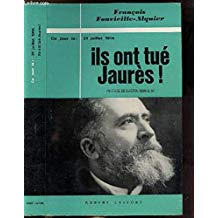A sentence from Jean Jaurès in the Hall of the Four Columns of the National Assembly could admirably summarize this book, the unfolding of a day, this July 31, 1914, the day of the assassination of the socialist tribune.
His words: “Will we have to make war because the promise made by d’Aerenthal to Iswolsky, to give him as a tip 40 million for the arrangement of Austria with Bosnia-Herzegovina, was not kept? Is that why we are going to shed and see the blood of the peoples of Europe flow?”
In this sentence, we have the mastermind behind the politics and diplomacy of Russia. The tsar is absent, overwhelmed, and when he communicates with his cousin, not by rank but by blood, he admits his helplessness. Jean Jaurès clearly foresaw the consequences of these alliances, where France would be drawn into a war for Serbia.
They killed Jaurès, who? We never got the answer. Raoul Villain is described to us as some kind of idiot, half mad. How convenient to escape the questions. Who armed him? Who incited him to kill?
Jaurès was the only man capable, with his aura and his words, of preventing the war. He denounced the alliance with Russia, advocated negotiation, and wanted to believe in class solidarity among workers beyond borders. Unite them to say no to the spiral, no to war. He was assassinated. The first reaction of his friends: “They killed Jaurès!” They, who? Perhaps a clue lies in the despicable acquittal of Raoul Villain after the war and its carnage.
A book about a day, whose outcome is the death of a man, the war as a curtain fall, and 1,500,000 dead just for France, thank you, Mr. Raoul Villain, all this blood is on your shoulders.
Thierry Jan


